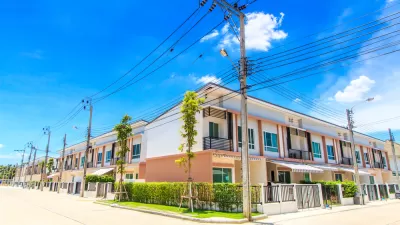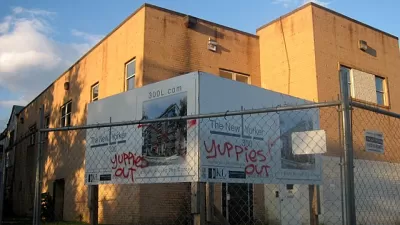Both supporters and opponents of the sprawl status quo often refer to suburbia as “The American Dream.” One sprawl-defending organization even calls itself “The American Dream Coalition.”
Both supporters and opponents of the sprawl status quo often refer to suburbia as "The American Dream." One sprawl-defending organization even calls itself "The American Dream Coalition". Sprawl critics use similar language; for example, in 1998, the Sierra Club issued a report titled "Sprawl: The Dark Side of the American Dream."
The equation of the "American Dream" with sprawl is inconsistent with the term's original meaning. The term "American Dream" was apparently invented in 1931 by historian James Truslow Adams; he was referring to "That dream of a land in which life should be better and richer and fuller for every man, with opportunity for each according to his ability or achievement." (Youngro Lee, To Dream Or Not To Dream, 16 Cornell Journal of Law and Public Policy 231, 232). Thus, the term "American Dream" means not one type of house on one type of lot, but an economy open to talent, whether in dense cities, streetcar suburbs, or small towns.
More importantly, the use of the term "American Dream" to describe just one type of development is so inconsistent with America's libertarian values as to be almost un-American.
In the Declaration of Independence, Thomas Jefferson wrote that people are "endowed by their creator with certain unalienable rights, that among these are life, liberty and the pursuit of happiness." To me, "liberty" implies some diversity of living arrangements - not just suburbs, but big cities and small, rural retreats and small towns. "Liberty" implies that Americans should be free to create Manhattan as well as Montana.
By contrast, the use of the term "American Dream" to describe the sprawl status quo implies that only one form of development is "American" - that large-lot suburbia, as the "American Dream", is what all real Americans want, and that cities and small towns and rural areas are for foreigners. There is nothing particularly libertarian about such an attitude.
Sprawl critics weaken their position by allowing their opponents to get away with such abuses of patriotism. Instead, supporters of more compact development should be reclaiming the mantle of Americanism themselves - for example, by suggesting that people are freer when they can walk as well as drive.

Manufactured Crisis: Losing the Nation’s Largest Source of Unsubsidized Affordable Housing
Manufactured housing communities have long been an affordable housing option for millions of people living in the U.S., but that affordability is disappearing rapidly. How did we get here?

Americans May Be Stuck — But Why?
Americans are moving a lot less than they once did, and that is a problem. While Yoni Applebaum, in his highly-publicized article Stuck, gets the reasons badly wrong, it's still important to ask: why are we moving so much less than before?

Research Shows More Roads = More Driving
A national study shows, once again, that increasing road supply induces additional vehicle travel, particularly over the long run.

Which US Rail Agencies Are Buying Zero-Emissions Trains?
U.S. rail agencies are slowly making the shift to zero-emissions trains, which can travel longer distances without refueling and reduce air pollution.

San Diego School District Approves Affordable Housing Plan
The district plans to build workforce housing for 10 percent of its employees in the next decade and explore other ways to contribute to housing development.

Lawsuit Aims to Stop NYC’s ‘City of Yes’ Zoning Reforms
A lawsuit brought by local lawmakers and community groups claims the plan failed to conduct a comprehensive environmental review.
Urban Design for Planners 1: Software Tools
This six-course series explores essential urban design concepts using open source software and equips planners with the tools they need to participate fully in the urban design process.
Planning for Universal Design
Learn the tools for implementing Universal Design in planning regulations.
City of Moreno Valley
Institute for Housing and Urban Development Studies (IHS)
City of Grandview
Harvard GSD Executive Education
NYU Wagner Graduate School of Public Service
City of Cambridge, Maryland
Newport County Development Council: Connect Greater Newport






























